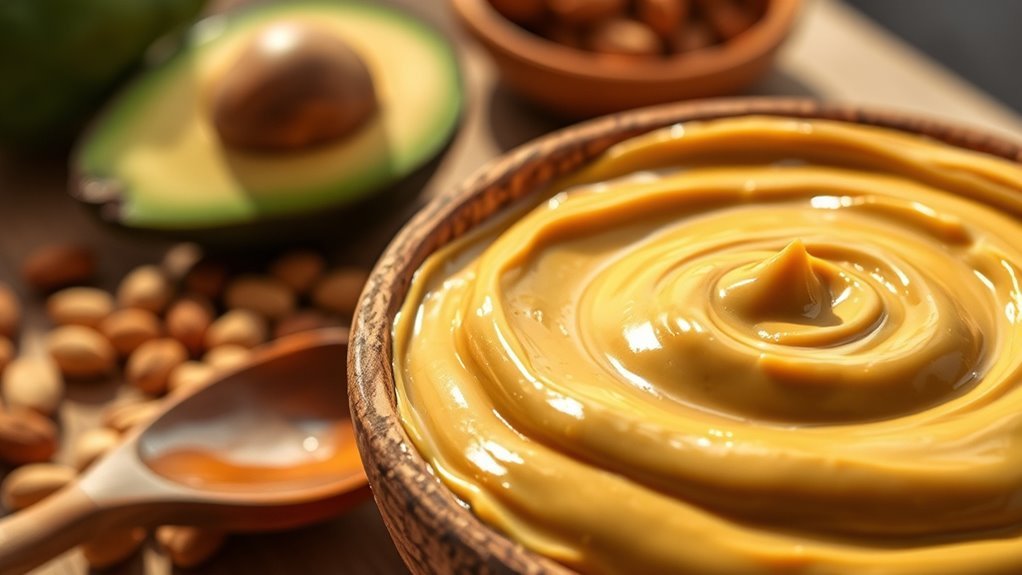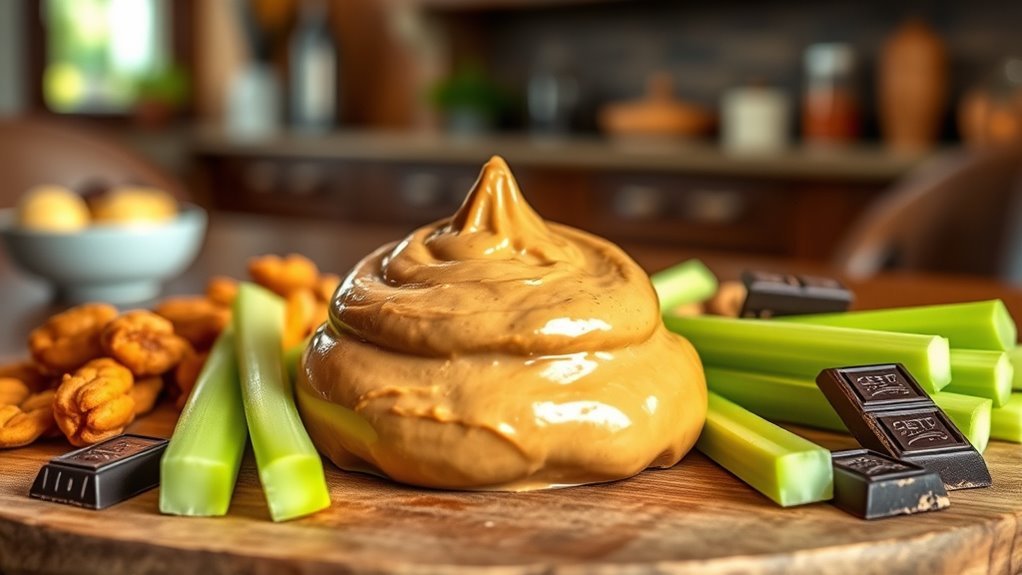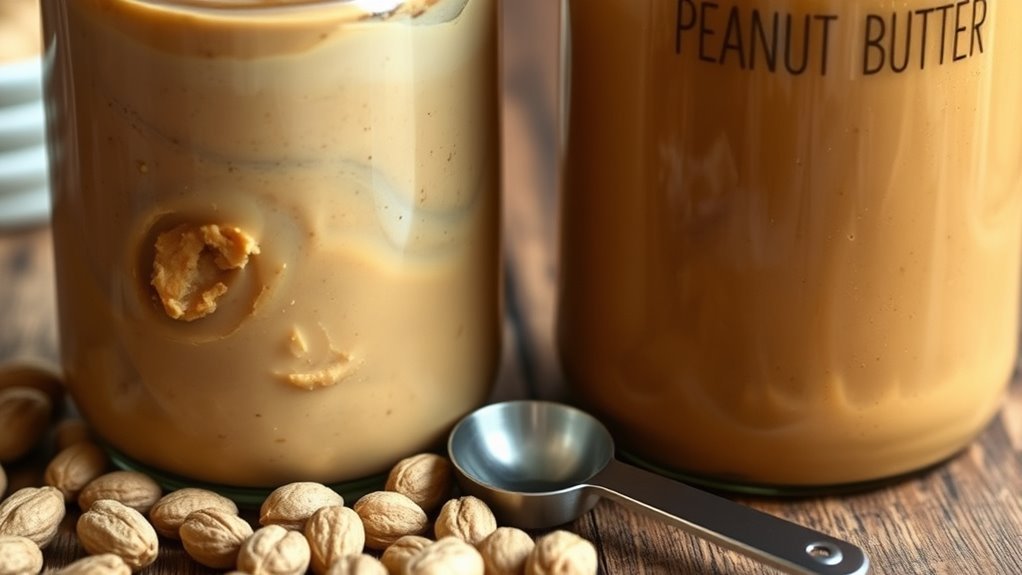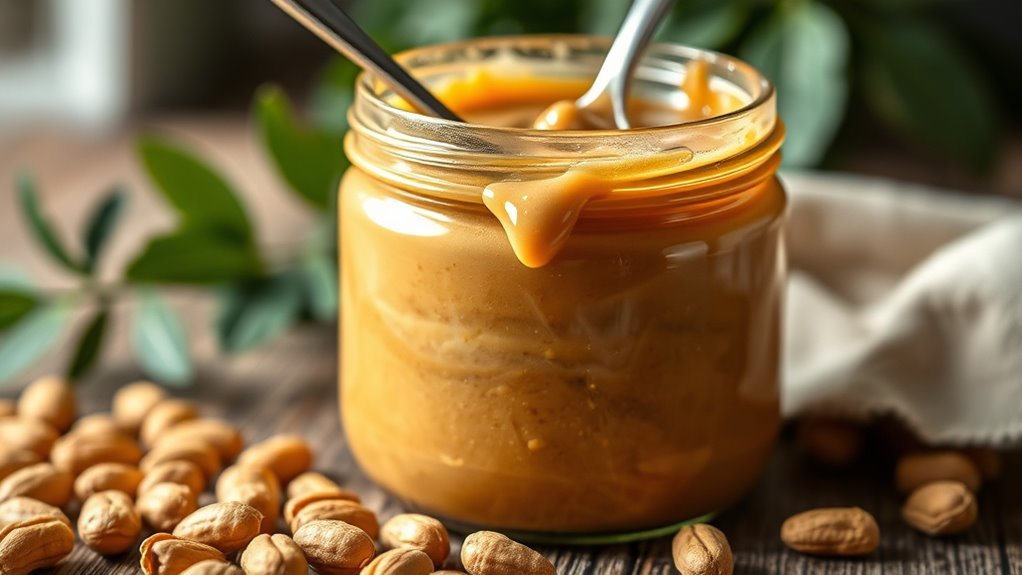Peanut butter is generally keto-friendly when consumed in moderation. A typical serving of natural peanut butter contains about 6-8 grams of total carbs and 4-5 grams of net carbs, making it suitable for a low-carb diet. Its high healthy fat and protein content can aid in satiety and support your keto goals. Just make sure to choose natural varieties without added sugars. There’s more to learn about portion control and creative uses for peanut butter in your diet.
Understanding the Nutritional Profile of Peanut Butter

When considering whether peanut butter fits into a keto diet, it’s important to analyze its nutritional profile. Peanut butter varieties can differ markedly in their composition. For instance, natural peanut butter often contains fewer additives and sugars compared to processed options. In nutritional comparisons, you’ll find that a typical serving of natural peanut butter contains about 8 grams of protein and 16 grams of fat, making it a decent source of healthy fats. However, be mindful of the carbohydrate content, which can vary among brands. Choosing a low-sugar option is essential if you’re aiming to maintain ketosis. By understanding these differences, you can make informed decisions that align with your dietary goals while enjoying the rich taste of peanut butter.
Carb Content in Peanut Butter

When considering peanut butter on a keto diet, it’s essential to look at its carb content. You’ll find that the nutritional breakdown reveals both total carbs and net carbs, which is important for maintaining ketosis. Remember, serving size plays a significant role in how these carbs impact your daily intake.
Nutritional Breakdown Overview
Peanut butter, a popular spread among health enthusiasts, offers a relatively low carbohydrate content, making it a suitable option for those following a ketogenic diet. Its nutritional benefits extend beyond just carbs, as it’s packed with healthy fats and protein, contributing to a balanced diet. Here’s a quick breakdown of its calorie count and carb content:
| Nutrient | Amount per 2 tbsp |
|---|---|
| Calories | 190 |
| Total Carbohydrates | 6g |
| Dietary Fiber | 2g |
| Net Carbs | 4g |
With this information, you can see how peanut butter fits into your keto lifestyle while providing essential nutrients. Enjoying it in moderation can enhance your meals without compromising your carb limits.
Net Carbs Calculation
Understanding the net carbs in peanut butter is essential for anyone on a ketogenic diet. To calculate net carbs, you subtract fiber and certain sugar alcohols from the total carbohydrates. Peanut butter typically contains about 6-8 grams of total carbs per two-tablespoon serving. With around 2-3 grams of fiber, the net carbs calculation would bring you to approximately 4-5 grams of net carbs per serving. This makes peanut butter a keto-friendly option, especially when enjoyed in moderation. However, it’s important to check labels, as some brands may add sugars or other ingredients that can increase carb content. Being mindful of these factors can help you stay on track with your keto goals while enjoying this delicious spread.
Serving Size Matters
Serving size plays an essential role in determining the carb content of peanut butter. If you’re on a keto diet, understanding portion awareness is vital. A standard serving is typically 2 tablespoons, containing about 6-8 grams of carbs. However, it’s easy to exceed this when you enjoy peanut butter as a snack or spread.
To stay within your daily carb limits, be mindful of your serving suggestions. Consider measuring out your portions to avoid going overboard. If you’re craving more, try pairing it with low-carb options like celery or cucumber slices to keep your intake balanced. By maintaining portion awareness, you can enjoy peanut butter while sticking to your keto goals, giving you the freedom to savor this delicious spread.
Comparing Natural vs. Processed Peanut Butter

When choosing between natural and processed peanut butter, it’s important to evaluate their nutritional differences and ingredient quality. Natural peanut butter typically contains fewer additives and preservatives, which can impact your overall health and potentially your state of ketosis. Understanding these factors can help you make a more informed choice that aligns with your keto diet goals.
Nutritional Differences Explained
Although both natural and processed peanut butter can fit into a keto diet, their nutritional profiles differ considerably. Natural peanut butter typically contains just peanuts and salt, preserving healthy fats and nutrients. In contrast, processed varieties often include added sugars, oils, and preservatives, leading to higher carb counts. Many people fall prey to nutritional misconceptions, believing all peanut butter is equal. You should be aware that the quality of these peanut butter varieties affects your overall health and keto success. For instance, while both types provide protein and healthy fats, the additives in processed options can hinder your nutritional goals. Choosing natural peanut butter can help you stay committed to your keto lifestyle while enjoying a delicious spread.
Ingredient Quality Matters
Ingredient quality considerably impacts your health and keto journey, especially when comparing natural and processed peanut butter. The sourcing of ingredients plays an essential role in the nutritional value and overall health benefits you receive. Natural peanut butter typically contains just peanuts and possibly salt, while processed varieties may include added sugars, oils, or preservatives. Choosing organic options can further enhance the quality, ensuring you’re avoiding pesticides and synthetic additives.
| Type | Ingredient Quality |
|---|---|
| Natural Peanut Butter | Minimal additives, healthier fats |
| Processed Peanut Butter | Added sugars and oils |
| Organic Options | No pesticides, higher quality |
| Nutritional Value | Higher in nutrients |
| Taste | Richer, more authentic flavor |
Opt for natural over processed for the best results.
Impact on Ketosis
Many people wonder how peanut butter fits into a ketogenic diet, particularly when weighing the differences between natural and processed varieties. Natural peanut butter, with its minimal ingredients, typically contains fewer additives and sugars, making it a better choice for those in keto adaptation. On the other hand, processed varieties often include added oils and sugar, which can hinder ketosis and affect your overall peanut butter consumption. The carb content in natural peanut butter is lower, helping maintain your desired macronutrient ratios. While moderation is key, choosing natural options can assist you in enjoying peanut butter without derailing your ketogenic goals. Always check labels to verify you’re making the best choice for your dietary freedom and health.
Health Benefits of Peanut Butter
Peanut butter isn’t just a delicious spread; it also boasts several health benefits that can enhance your diet. Rich in nutrient density, it provides essential vitamins and minerals, making it a smart choice for those seeking balance. The healthy fats in peanut butter support heart health, helping to lower bad cholesterol levels. Plus, it can aid in weight management, as its combination of protein and healthy fats promotes satiety, reducing the likelihood of overeating. If you’re active, peanut butter can assist with muscle recovery due to its protein content, helping your body repair after workouts. Overall, incorporating peanut butter into your diet can yield numerous health benefits while satisfying your taste buds.
Portion Control: How Much Peanut Butter Is Keto-Friendly?
How much peanut butter can you enjoy while sticking to a keto diet? Portion sizes are key, as peanut butter is calorie-dense and contains carbohydrates. Generally, sticking to 1-2 tablespoons per serving is a good guideline to remain within daily limits.
Here’s a quick reference:
| Portion Size | Carbs (g) | Calories |
|---|---|---|
| 1 tbsp | 3.2 | 94 |
| 2 tbsp | 6.4 | 188 |
| 3 tbsp | 9.6 | 282 |
| 4 tbsp | 12.8 | 376 |
| 5 tbsp | 16.0 | 470 |
Keeping your portions controlled helps you enjoy peanut butter while maintaining ketosis. Remember, moderation is essential to stay within your daily carb limits!
Creative Ways to Incorporate Peanut Butter Into a Keto Diet
While you might think that following a keto diet limits your snack options, incorporating peanut butter can actually add flavor and nutrition to your meals. Try making peanut butter smoothies with unsweetened almond milk and spinach for a nutrient boost. Peanut butter energy balls are perfect for on-the-go snacks, mixing in low-carb ingredients like chia seeds and coconut flakes. For a satisfying treat, whip up peanut butter fat bombs, combining the nut butter with coconut oil and cocoa powder. You can also create delicious peanut butter dipping sauces to pair with celery sticks or cucumber slices. Finally, indulge in peanut butter desserts like keto-friendly cookies or brownies, satisfying your sweet tooth without derailing your diet.
Alternatives to Peanut Butter for Keto Dieters
Are you looking for tasty alternatives to peanut butter that fit your keto lifestyle? Consider almond butter, which is low in carbs and high in healthy fats, making it a great choice for your diet. Sunflower seed butter is another excellent option, providing a nut-free alternative that’s rich in vitamins and minerals. If you crave something creamier, coconut butter offers a deliciously rich flavor and a good source of medium-chain triglycerides (MCTs), beneficial for energy. Finally, cashew butter is slightly sweeter and still maintains a low carb count, perfect for adding to smoothies or snacks. These alternatives can diversify your diet while keeping you aligned with your keto goals. Enjoy experimenting with different flavors!
Potential Risks of Eating Peanut Butter on Keto
Peanut butter, despite its popularity, can pose certain risks for those following a keto diet. First, you should be aware of allergy concerns; many people are allergic to peanuts, which can lead to severe reactions. Additionally, some brands contain added sugars or unhealthy oils that can disrupt your ketosis.
Here’s a quick summary of potential risks:
| Risk Type | Description |
|---|---|
| Allergy Concerns | Peanut allergies can cause serious reactions. |
| Digestive Issues | High fiber content may lead to discomfort. |
| Hidden Carbs | Added sugars can kick you out of ketosis. |
Being mindful of these factors can help you make informed decisions on whether to include peanut butter in your keto lifestyle.
Frequently Asked Questions about Peanut Butter and the Keto Diet
1. Is peanut butter low in carbohydrates?
Yes, peanut butter is relatively low in carbohydrates compared to other spreads. A typical serving of natural peanut butter (two tablespoons) contains about 6-7 grams of carbohydrates, with around 2-3 grams of fiber. This makes the net carbs approximately 4-5 grams, which is suitable for a keto diet, as it allows you to stay within your daily carb limit.
2. Can I eat any type of peanut butter on a keto diet?
While peanut butter can fit into a keto diet, it’s essential to choose natural or unsweetened varieties. Many commercial peanut butters contain added sugars and oils, which can increase the carb content and negate the benefits. Always check the ingredient list and opt for brands that contain only peanuts and salt for a healthier option.
3. What are the health benefits of peanut butter on a keto diet?
Peanut butter is rich in healthy fats, protein, and essential nutrients like vitamin E, magnesium, and potassium. These nutrients can help keep you satiated, support muscle maintenance, and provide energy while following a keto diet. Additionally, the monounsaturated fats in peanut butter can promote heart health when consumed in moderation.
4. How much peanut butter can I eat on a keto diet?
The amount of peanut butter you can consume on a keto diet depends on your overall carbohydrate goals for the day. Generally, 2 tablespoons of peanut butter is a common serving size, providing a balance of fats and proteins while keeping carbs relatively low. However, it’s crucial to monitor your total daily carb intake to ensure you stay within your limits.
5. Are there any alternatives to peanut butter for keto dieters?
Yes, if you are looking for alternatives to peanut butter, consider almond butter, macadamia nut butter, or sunflower seed butter, which are all keto-friendly options. These alternatives often have a similar nutritional profile and can provide different flavors and textures to your meals and snacks while maintaining low carbohydrate content.
References
- https://www.healthline.com/nutrition/peanut-butter-keto
- https://www.medicalnewstoday.com/articles/324125
- https://www.dietdoctor.com/low-carb/food-list/peanut-butter
- https://www.ncbi.nlm.nih.gov/pmc/articles/PMC6832080/
- https://www.webmd.com/diet/obesity/what-is-ketogenic-diet
- https://www.hopkinsmedicine.org/health/wellness-and-prevention/the-ketogenic-diet
- https://www.eatright.org/health/wellness/healthy-eating/the-ketogenic-diet
- https://www.verywellfit.com/what-is-the-ketogenic-diet-5201952


